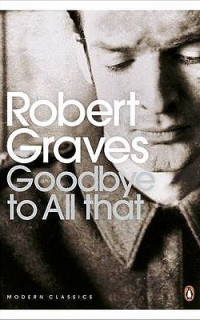Title
Goodbye to all that
This title is only repeated once, in the last sentence of the book. However, I do believe the connection with the story is bigger than just the reason given in this sentence. This is written in the last sentence:
"So I went abroad, resolved never to make England my home again; which explains the “Goodbye to All That” of this title." (P. 356)
I believe this title is connected to the story in another way. Robert writes about his life in a very organised way. First about his time travelling around, later about him going to school at Charterhouse. At chapter 7, Robert starts to write about him signing up for the war. After about two-thirds of the book, the war is over and Robert begins to speak about his after-war life and with that about all the trauma he is suffering from.
The way the book is organised, really explains the title to me. It starts with his youth then he abruptly moves on to his wartime story. Next he leaves that part of his life behind, marries and has four children. Finally, he separates from his wife. He says goodbye to all that’s behind him, all that has happened in the past.
Robert also says goodbye to the English society. He doesn’t want to be a part of it any more, as he says in the book.
Summary dramatic line
In this summary I discuss vital parts of the story. Most of the fictional books contain a clear climax. This book doesn't, because it tells a real man's life story. The book is divided into three different parts. The start of Roberts life, his life during the war and his life after the war. Therefore, I decided to summarise the book into those three parts.
Start of the book
The book opens with Robert recalling his earliest memories of his life and describing his youth. He doesn’t have a nice childhood. His family is away all the time. He went to six different preparatory schools. He spent the most time at his last school, Charterhouse. He dislikes this school the most, compared to the others, due to all the erotic tension between the boys on this school. This school, filled up with boys who are at their sexual peak, has the problem of no available girls or masturbation. Therefore, the boys have decided to use the weaker boys as sex toys. The weak boys belong to the stronger ones. Of course, this was ridiculous and Robert was flabbergasted about this. At some point, he actually decides to write a letter to his parents to have him switch schools. His parents on their turn sent the letter back to the so-called house master who then gives the house he is leading a speech about informers and betrayers. Nobody suspects Robert at first, but when his parents visit him outside of the normal visiting periods rumours are spread and Roberts gets completely excluded from the school's social interactions.
A little bit later he finally reclaims some of his reputation after joining the schools boxing competition. He also gets to play football, which makes him much more popular too.
Wartime
The second part of the book starts on the day he signs up for the British military. He completes the officer's school at the special reserve right away. Robert clearly has trouble commanding far more experienced soldiers, because Robert is way younger than they are. He finds it hard to make those men do as he tells them to do.
The war continues and Robert is sent to the first front. What he encounters there, does have an impact on Robert. Even though he doesn’t recall it in the story anywhere except on the moment itself. The first corpse he sees on the battlefield is one of a suicidal man. The man first lost a big part of his battalion. After that he received word that his girl got sick. This was too much for him and he committed suicide
Robert resumes his time in this part of France, fighting the Germans. He encounters gas, is bombed, fights with his battalion, meets more soldiers and gets transferred. There he meets more soldiers, fights some more and gets wounded. He’s transferred back again to England to recover.
He recovers quickly. He goes to some social events while being back in England and meets veterans, some due to age, some due to injuries. But Robert doesn’t seem to be moved by this. He’s even glad to be sent back to the trenches. He didn’t like his time back in England:
“Once more I was glad to be sent up to the trenches.” (p. 247)
He is sent to the front for the second time. This time near the river Somme. He meets a new good friend, named Siegfried. They both like poetry and really get close.
A few months later Robert is hit during combat again. This time in his chest damaging his lung. This injury is too serious and he is unable to go back to war.
He is transferred to a hospital in Oxford and recovers there while realising he probably has survived the war, because he is unfit to be sent back out again. After that he starts to train new soldiers. While training these new soldiers he finds himself unfit for this type of exercise so he goes back to Liverpool to recover once more.
After the war
The actual war isn't over yet, but it is for Robert, since he is not fit enough to go back to battle again. In this period of time, he meets his future wife Nancy. They decide to get married. During this time in his life he struggles most with all his traumas and other difficulties he suffering from. Most of which are cause by the war.
Het boekverslag gaat verder na deze boodschap.
Verder lezen









REACTIES
:name
:name
:comment
1 seconde geleden